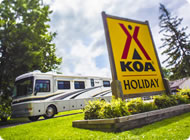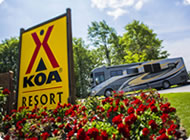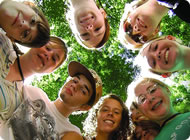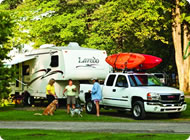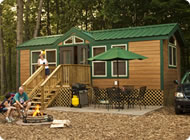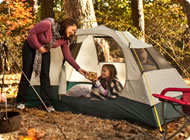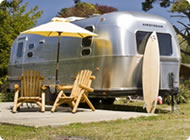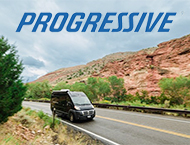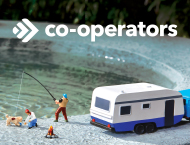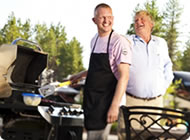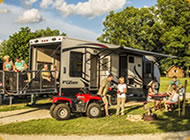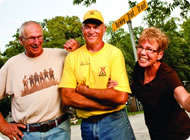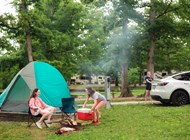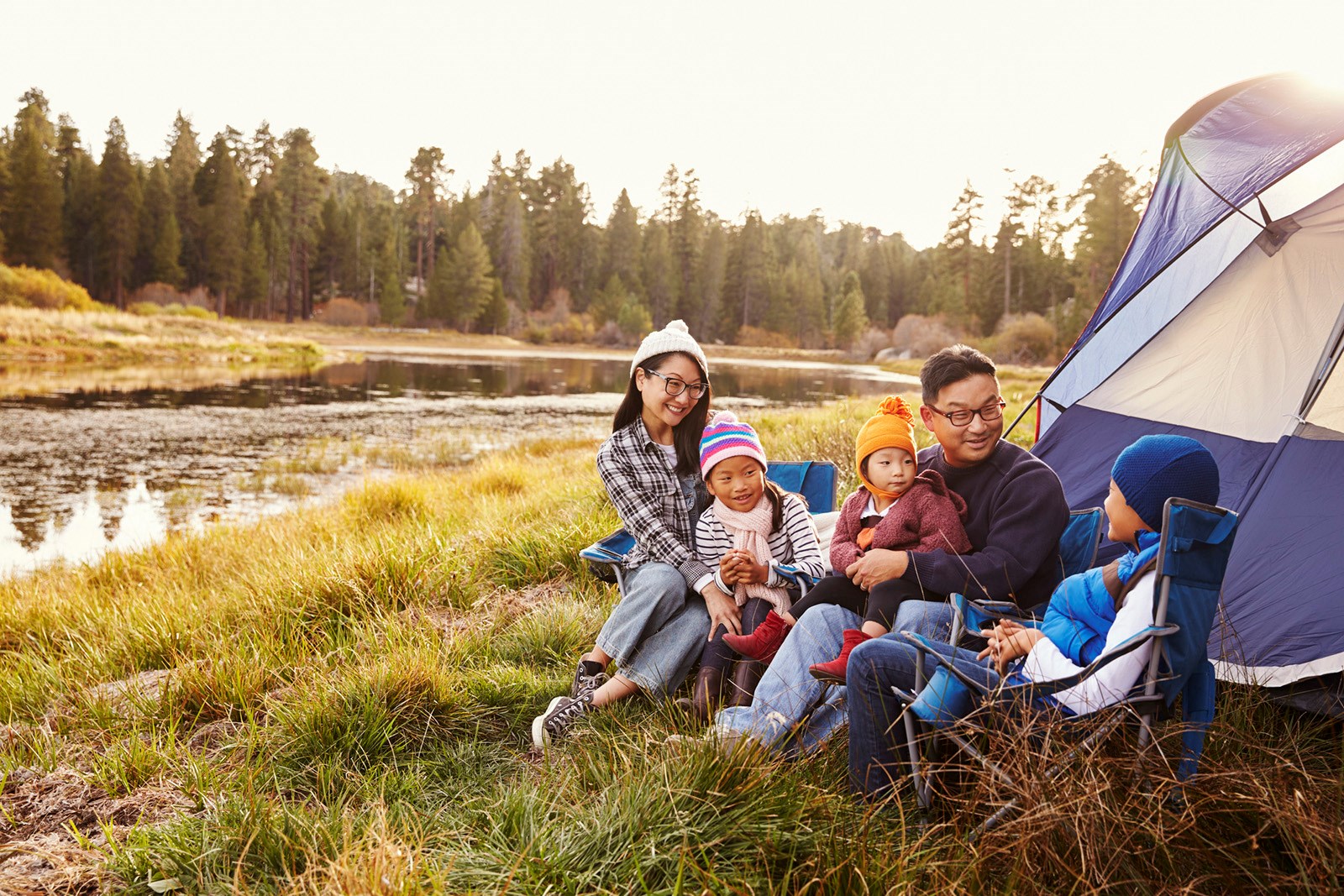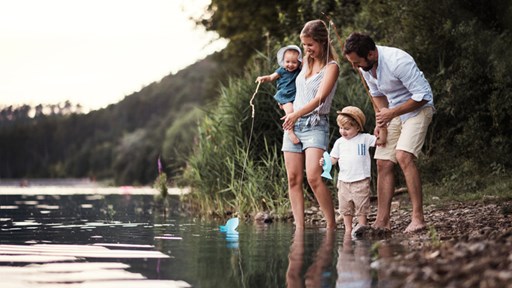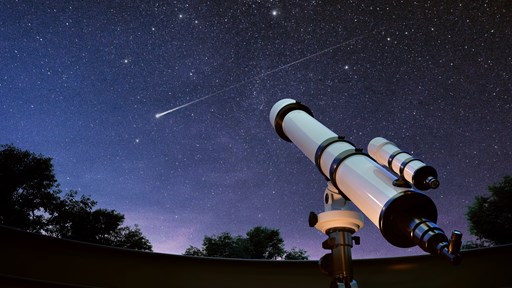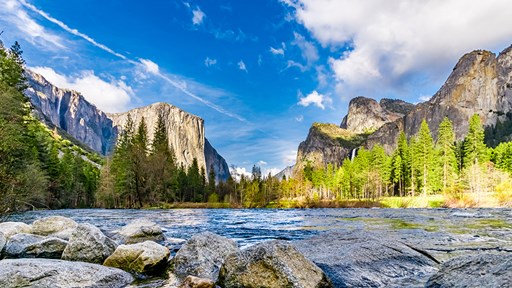These are the tips you need for camping when school is in
It’s the last few days of August. The sun is high, the days are long. This is the time of year when it’s common to feel nostalgia for a summer that’s not yet over.
Towards the end of each summer, it seems, everyone is preparing to say “goodbye” to beach days, grilling out, movie nights, and camping trips.
It’s time to say “hello” to back-to-school lists, dinners inside, and reasonable bedtimes.
Except, maybe there’s no need to say “goodbye” to some of these things at all. Like camping. Camping’s not just for summer! And even if the kids are heading back to school (especially if the kids are heading back to school) why not keep camping trips on regular rotation?
Nothing beats camping on a crisp autumn weekend when the leaves are turning. Memories are made dog sledding at a winter camp. And waking up in a tent while the flowers and trees are waking up around you in springtime can be pure magic.
Don’t let busy weeks and back-to-school schedules throw you off camping for the majority of the year. After all, it’s possible to have great camping experiences that are close to home. And don’t forget you can score some awesome camping spots for longer holidays and school breaks.
Whether your family homeschools or does a traditional school, family camping trips are unmatched if you’re looking to connect, build on lessons, get hands-on, and center yourself in the great outdoors.
What are you waiting for? Get camping … even — especially — during the school year!
Top School Time Camping Tips
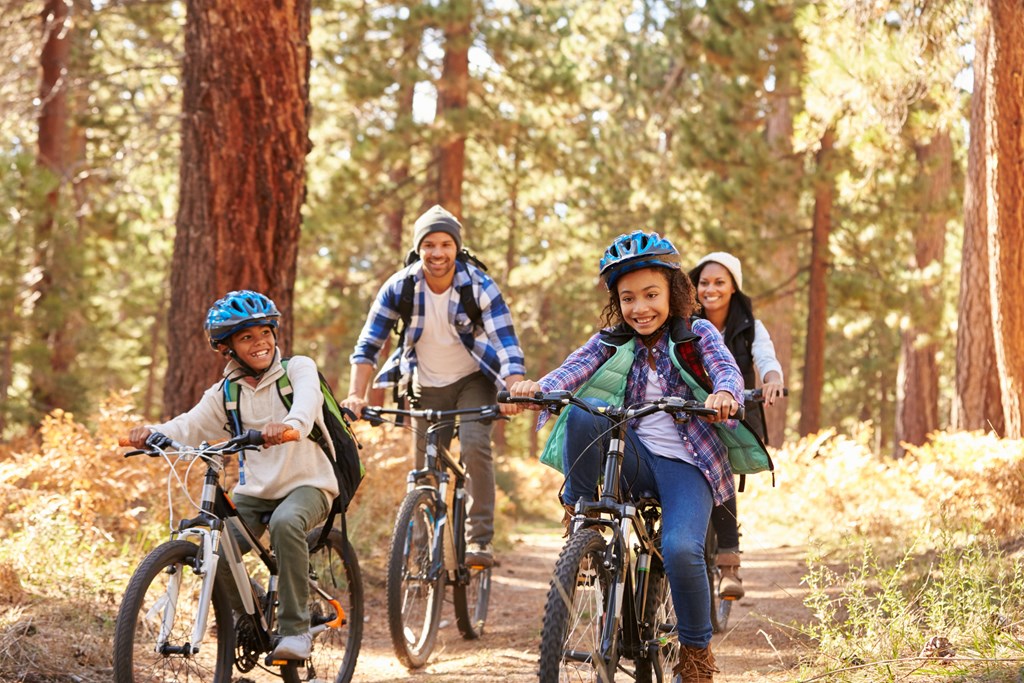
1. Plan the perfect the two-night camping trip
Straight talk — even the very thought of planning and prepping for a camping trip can be daunting, if not paralyzing. And if you’ve got a somewhat short trip to plan and prep for, it almost becomes that much tougher.
Why?
Sometimes planning, packing, setting up, and tearing down a very short camping trip can be so exerting, it can make you wonder if the “off” time is worth it.
Remember that lots of great camping trips happen Thursday through Sunday or Friday through Sunday. Even though it makes for a shorter trip, if you prep ahead, work as a team, and factor in some super easy meals, these weekend trips can be a blast.
The more experienced you get as a camper, and the more tips and “hacks” you find that work for you and your family, the easier it becomes.
For those short, two-night weekend camping trips, keep it close to home. See what campgrounds or dispersed camping you can do just an hour or two away.
When it comes to the packing list for a shorter trip, it’s common to fall victim to either overpacking or under-packing. It’s crucial to have a handy list to reference for each trip. Many lists can be found online that one can review, copy, or even purchase. You can even make your own.
But any camping ‘essentials’ list should include the following categories:
- Camping equipment
- Food
- Water
- Clothing
Accessories are nice to have (i.e., a tent fan for hot weather), but these primary categories are most crucial to safety and comfort.
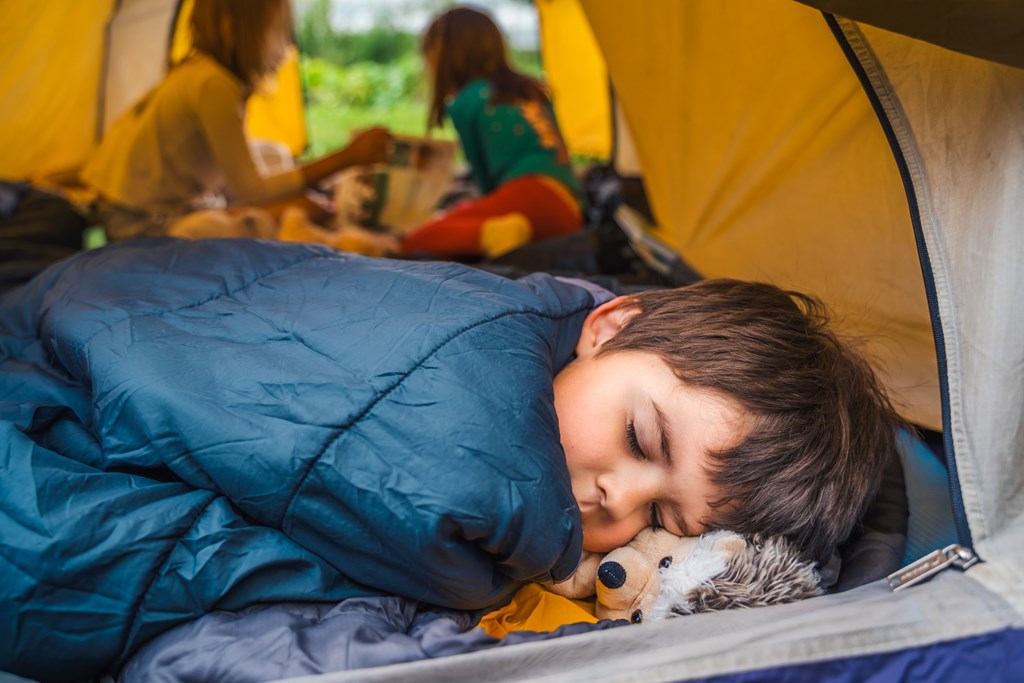
Have a list that matches up to the type of camping you’ll be doing: family tent camping, family RV camping, backpacking, and the season, and then continually review and revise. While it may take a bit of time and effort in the beginning, each item and decision will soon become second nature.
Tent camping, for example, requires:
- A tent
- Sleeping bags
- Sleeping mats
- Backpacks
- Head torches/flashlights
- A stove with fuel and/or cookware
- Toiletries (toilet paper, sunblock, toothbrushes, toothpaste, medication)
- A lighter or fire starter
If you won’t have easy access to clean water, you’ll need to take water camping with you for drinking, cooking, and cleaning.
For food, plan for two evening meals, two breakfasts, and a lunch or two. To save on weight and work, it’s a good idea to get creative with dehydrated and nonperishable foods like noodles, flour tortillas, and peanut butter.
Consider cooking a fresh dinner the first night and a dehydrated or nonperishable food dish (like spaghetti or prepackaged Thai!) the second night. Eat bacon and eggs the first morning, and save that muesli and berries for the next day’s breakfast. Once you have your needs down, you can have some fun with the nice-to-haves. Do you consider a pillow a must-have for a two-night camping excursion (or you can stuff a couple of clean pillowcases with clothes and towels?)
Finally, it’s so helpful to have a camping tote or two prepped, packed, and ready to go for impromptu and brief camping trips. Just be sure to clean out and restock the tote each time so it’s ready to go for your next jaunt!
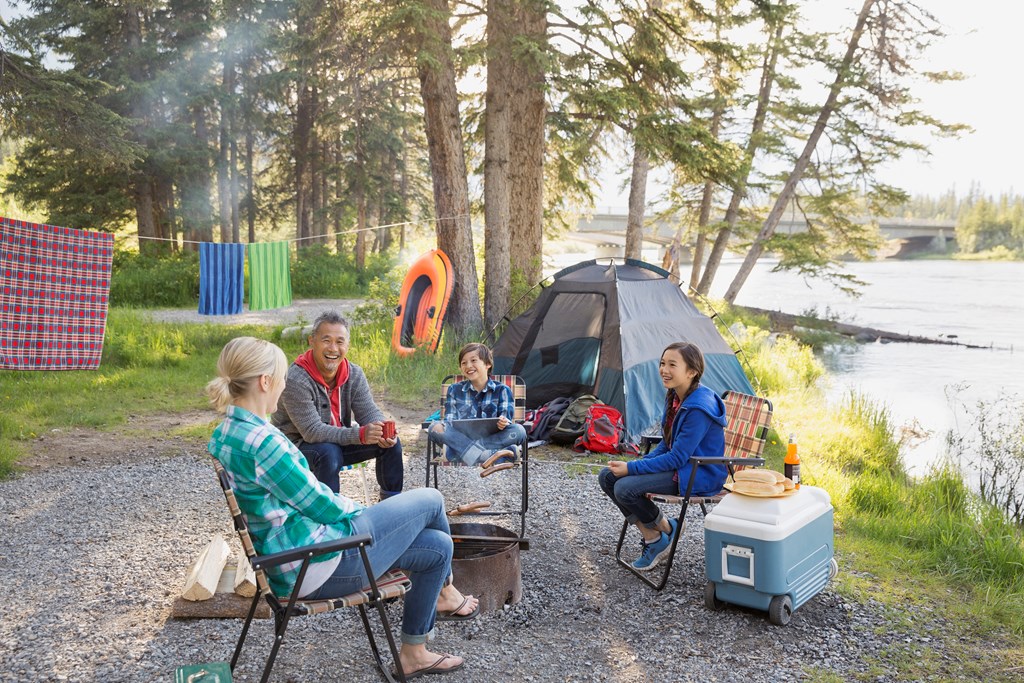
2. Get your ducks in a row if taking a longer excursion
If you are looking to schedule one or two ‘during-the-school-year’ camping trips that will be longer than a weekend, plan ahead so you can set out on the road without any stress or worry.
Touch base with the child’s (children’s) teacher(s) and see if they can take any work with them so as not to fall behind.
Katie Dillon at La Jolla Mom is an avid traveler along with her husband and daughter. Even though she travels extensively, she maintains kids shouldn’t be pulled out of school too often for travel. Her family does the majority of their trips during school holidays.
Here are some of her tips for ensuring a stress-free and productive vacation during the school year school:
- Look at holiday calendar: First, review your school district’s policy and calendar well in advance. Then go ahead and carefully look at the following school year calendar on the district website. “Make a note of every single holiday … as soon as you can. Then start thinking about the types of holidays that you can schedule during these days, or partial days off, and be prepared to execute,” says Dillon.
- Book in advance: Next, plan your travel (booking campsites, tickets, reservations) well in advance — even a year in advance — to lock in your site and activities.
- Organize schoolwork: If a child will be out of school for more than a few days, many teachers are happy to arrange for school work to be taken home (or on the road). This is great because kids will not fall behind, they have something to do during downtime, and the teacher need not catch the child up during class time. This is a great compromise if parents make sure the work gets done and is neatly returned to school.
- Consult with kids: Finally, be sensitive to your child’s wishes and avoid scheduling travel on any special school days that they enjoy, such as field trips, assemblies, show-and-tell, etc. Make sure each family member is “all-in.” This gets tougher the older kids get, but you also don’t want to hear about what and who they’re missing the entire trip.
- Communication is key: At the end of the day, communication with the school district, your child’s teacher, and your child is key to making the most of a trip that will involve an absence from school. Try to add an educational piece to every trip you go on, and make the most of your time away from the routine.
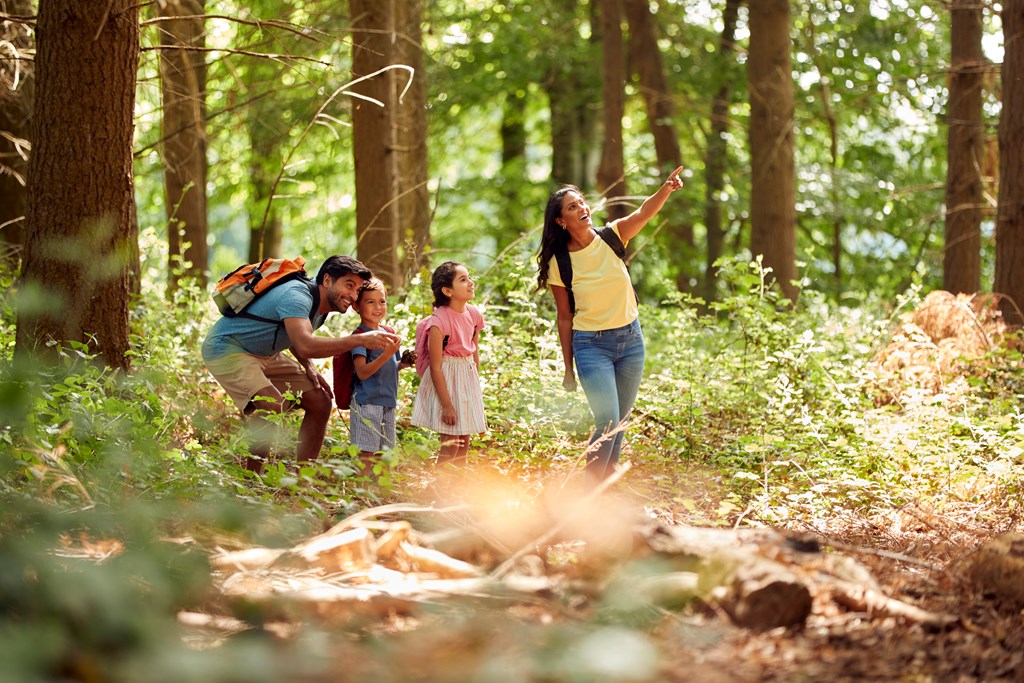
3. Try to hit all seasons
Camping in all seasons can be a beautiful thing. It’s a great way to slow down and appreciate nature’s ebb and flow.
Most campers, hikers, and outdoor lovers schedule trips for the spring and summer months (and the summer months are the go-to camping months for families with school-aged kids).
Consider this your reminder to think outside the summer months, refer to your school’s break periods and holidays (as mentioned above), and get out to explore those other three seasons of the year.
If you’re not used to camping in cooler months, don’t fret. It’s just a matter of tweaking some clothing, gear, and food items. After a few times of setting up a fall or winter camp, you might even come to find you prefer it!
Think of all-season camping as a challenge as well as an opportunity.
Fall camping can be exquisite, with its mild weather, sparsely populated hiking trails, biting fish, and colorful fall foliage. Try to schedule your trip during the peak of the season, when leaves are turning and putting on the best show. Many regions have a “leaf watch” to help you determine when peak season will hit. This window of time might be just a week or two.
As temps fall, don’t forget to pack and dress in layers, as the nights get chilly, but the days might still be very warm. Lightweight, natural materials like merino wool are a great choice for layering, but less-expensive options can be just as comfortable and effective. Bring a couple of camp blankets for extra warmth by the fire and inside the tent.
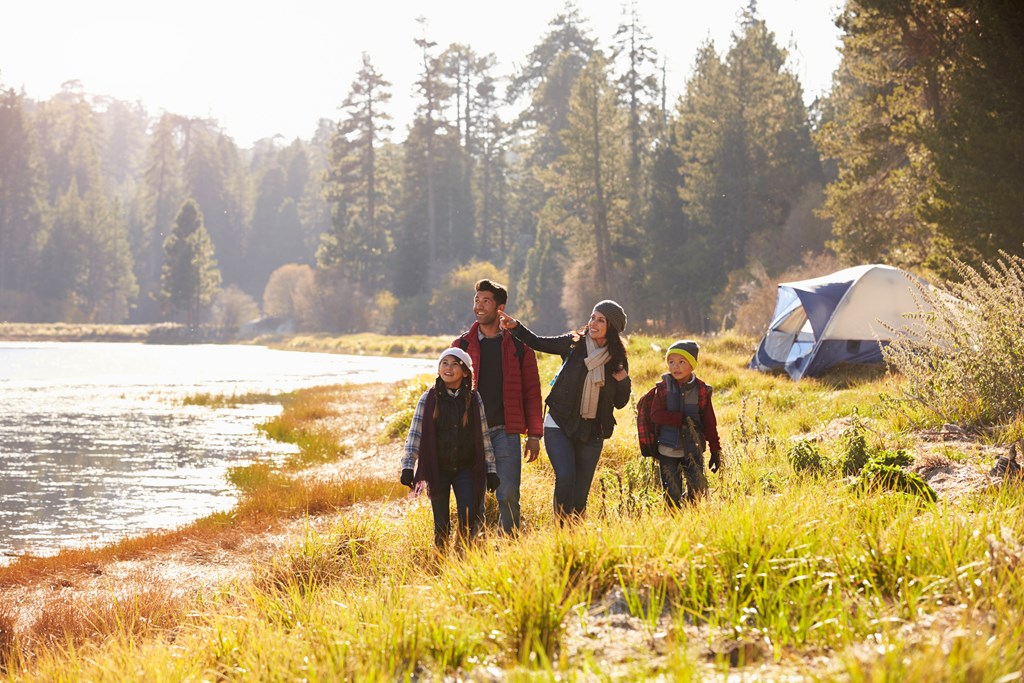
Another perk to camping in the fall is that it is often the easiest season to start and cook over a fire. Dead leaves and downed branches are ideal fire starters. Leave the camp stove at home! Instead, kick back and heat up ready-made chili, soup, and stews over an open flame. And don’t forget the roasted hot dogs, pudgy pies, and marshmallows.
Prep for the shorter days and longer nights by setting up the tent a few hours earlier and double-checking your battery stash before you leave home.
Winter camping can be a challenge for campers in snowy locations, but it can also be a great adventure.
If you are not a skilled camper but are curious about how winter camping works, consider joining forces with an outdoor wilderness adventure group in your area. These qualified guides will educate you about the gear you need, the precautions to take, and the activities you can enjoy while camping at the coldest time of the year.
Finally, spring is a fantastic time to set up camp and celebrate the return of warmer months. It can feel deeply spiritual to spend time outside after a long, dark winter and see the budding leaves, hear the singing birds, and feel the warm sunshine on your face.
Remember those spring rains and muddy trails, and dress accordingly. Come armed with some solid rain gear for your feet, body, tent, and camp. Pitch your tent far away from the water, and remember that the mosquitos and bugs are once again coming out to play.
Spring is one of the best times of year to do some bird-watching, as feathered friends are making their migratory returns and wearing their brightest colors. Be sure to pack a good pair of binoculars and a small field guide.
Grab a front seat as all of the forest wakes up. Spring is the time of year when nearly all animals are building nests, choosing mates, and going out into the world. Be respectful, be safe, and be ready to embrace the campsite in spring.

4. Unplug from electronics
Electronics have their place in modern life: Smartphones are useful multitools and communication devices, and tablets are handy for media and entertainment in the form of news, games, and shows.
But for many people, electronics are everywhere in daily life, and it can be tough to take a break from our devices (it’s tough for parents and kids!)
The beauty of being outdoors, camping with loved ones, is we get a respite from the digital world that so many of us desire and need.
If it works for your family, try having a ‘no electronics’ policy on the trip, or at least have some parameters that everyone agrees upon ahead of time. Taking a break from screens can benefit kids and adults. And a camping trip is the perfect opportunity to unplug, as you’ll already be outdoors, taking in new scenery and adventures.
Challenge yourself and your kids to use your vacation to take a vacation from tech. Need some help getting started? Here are some helpful tips:
- Make outside the destination: While you’re camping, you’re outdoors, and the possibilities for fun and relaxation are only limited by your imagination.
- Bring or invent some simple games to play: Bring books to read, and involve kids in the setting up, cooking, and fire-making aspects of camp. If the kids are young, bring bubbles. If they’re past the toddling state, bring scooters or bikes. During the downtime of camping, parents and kids can work together making a craft or playing board games or card games.
- This is an opportunity to try new activities like fishing and geocaching: Make a journey stick or fairy houses. Scavenger hunts and nature journaling is great. Basically, follow your child’s lead and get as simple or as complicated as you’d like with campsite activities.
- Try to avoid using electronics as a reward: While it’s ok to set limits for electronic use, rewarding kids with “extra time” can often backfire, as it places too much emphasis on devices.
Avoid using electronics as a distraction. It’s good for kids to be bored sometimes. Give them the space to simply gaze out the window during the car ride and break out the pencils and paper at the camp picnic table. Consider having a bag of age-appropriate toys/activity books/games that only come out on camping trips.
There are so many ways to have fun and relax without technology (especially on a camping trip!).
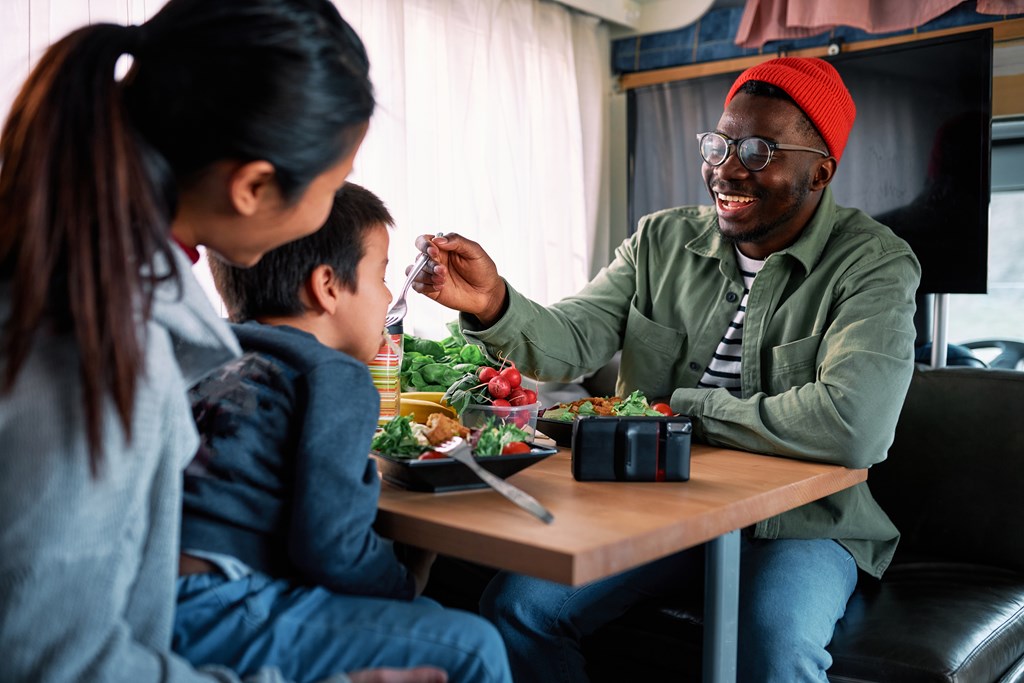
Taking kids camping during the school year is an excellent way for everyone to connect, destress, and learn new things. They won’t need to miss any school or learning opportunities if plan carefully, communicate with the school, and embrace weekend trips.
Camping year-round offers some fun and unique opportunities, like experiencing nature in all seasons, and even getting festive around holidays. A Halloween camping trip in the fall can be an amazing and memorable experience for kids and adults, too. And how fun would it be to camp at Christmastime?
Use your time camping to slow down the schedule and enjoy extra snuggles and together time. Sure, plan some hikes and fun stops, but don’t forget to rest and recharge. Everyone’s sure to return to work and school with happy memories and a brighter outlook.
Camping with kids doesn’t have to be a stressful multi-step operation. The more easygoing a camping trip is for your kids and you, the better.
Try out a bigger tent if that will make everyone more comfortable. Easy meals and snacks that don’t require a cooler are a significant space and energy saver. Get the whole family involved; even the littlest camper can be “in charge” of their day pack.
It’s never too early to start camping with kids, and even as kids get older and start school, it’s great to keep the camping momentum going! A camping trip (at any time of the year) provides a unique opportunity to build on kids’ hobbies and interests, not to mention just relax and be together.
The most important thing is to spend time as a family and get kids engaging with the outdoors on the regular.

Leslie, a.k.a. Copy Girl, is a copywriter who gets butterflies from telling stories through words.
Her voice comes from a place filled with passion, dreams, and lots of sugar. “Cake over steak” is her go-to motto.
With over 10 years of experience in crafting words, and years of embarking on travels that have taken this Montana girl to some incredible places, Leslie love the adventures of both body and mind her writing takes her on.
Everywhere she goes, she takes this advice with her:
“Hold on to your divine blush, your innate rosy magic, or end up brown.” – Tom Robbins, Jitterbug Perfume
To see what Leslie’s up to in the writing world, visit her website here.






